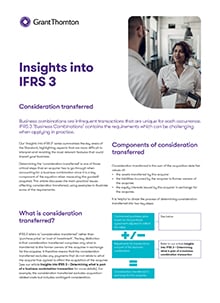

Download 'Consideration transferred'
This article discusses the main practical issues affecting consideration transferred, using examples to illustrate some of the requirements. Download the full pdf for example illustrations.
What is consideration transferred?
International Financial Reporting Standard (IFRS) 3 refers to ‘consideration transferred’ rather than ‘purchase price’ or ‘cost of investment’. The key distinction is that consideration transferred comprises only what is transferred to the former owners of the acquiree in exchange for the acquiree. It therefore means that the consideration transferred excludes any payments that do not relate to what the acquirer has agreed to effect the acquisition of the acquiree (see our article Insights into IFRS 3 – Determining what is part of a business combination transaction for more details). For example, the consideration transferred excludes acquisition related costs but includes contingent consideration.
Components of consideration transferred
Consideration transferred is the sum of the acquisition-date fair values of:
- the assets transferred by the acquirer
- the liabilities incurred by the acquirer to former owners of the acquiree
- the equity interests issued by the acquirer in exchange for the acquiree.
Contractual purchase price vs consideration transferred
Consideration transferred could differ from the contractual purchase price (ie the price stated in the purchase agreement) for different reasons. One of the reasons could be if the overall transaction or arrangement includes elements that (under IFRS 3’s principles) are not part of the business combination. However, it could also be because the fair value of the consideration transferred at the date of acquisition is not the same as the amount stated in the contractual arrangement to determine the purchase price.
The contractual purchase price may include more than one type of consideration. Certain types of consideration could affect reported results at the acquisition date, as discussed further below.
Deferred consideration
Deferred consideration is an obligation to pay a certain amount at a specified date after the date of acquisition. In this case there is no uncertainty regarding whether the amount needs to be paid or the total amount to be paid. Deferred consideration is included in the consideration transferred and is recognised and measured at fair value at the date of the business combination.
In determining the fair value of the deferred consideration, the acquirer adjusts the promised amount for the effects of the time value of money if the timing and amount of instalments agreed to by the parties (the acquirer and the seller) to the contract (either explicitly or implicitly) provides the acquirer with a benefit of financing for the acquisition of the acquiree. This could happen, for example, if the deferred consideration does not bear interest or bears a non-market interest rate. The unwinding of any discount of the deferred consideration is then recognised in the statement of profit or loss.
Contingent consideration
Many business combinations include contingent consideration, often referred to as an ‘earn-out clause’ and defined as an obligation of the acquirer to transfer additional assets or equity interests to the acquiree’s former owners if specified future events occur or conditions are met. This can be a useful mechanism to enable the acquirer and the vendor to agree on terms of the business combination in the face of uncertainties that may affect the value and future performance of the acquired business. A contingent consideration arrangement is inherently part of the economic considerations in the negotiations between the buyer and seller.
Such arrangements are commonly used by buyers and sellers to reach an agreement by sharing particular specified economic risks related to uncertainties about future outcomes of the acquiree. Differences in the views of the buyer and seller about those uncertainties are often reconciled by agreeing to share the risks so that favourable future outcomes generally result in additional payments to the seller and unfavourable outcomes result in no payments, lower payments, or in some cases it can result in consideration previously transferred being returned to the acquirer (ie contingent consideration classified as an asset).
In addition, it is important to note that:
- Goodwill is not adjusted after the acquisition date to reflect changes in the fair value or settlement of contingent consideration except for adjustments qualifying as measurement period adjustments (Our next article on Insights into IFRS 3 – Accounting when the business combination is incomplete at the reporting date will discuss that careful consideration should be given before the business combination is adjusted for items occurring after the date of acquisition) or arising from correction of errors.
- Some contingent consideration arrangements may include transactions that are accounted for separately from the business combination for instance where the additional payment is contingent on the seller remaining as an employee of the acquiree for a certain period after the combination.
As stated above, the classification of a contingent consideration obligation that meets the definition of a financial instrument as either a financial liability or equity is to be based on the relevant definitions in International Accounting Standard (IAS) 32i. It should be noted that IAS 32 includes in the definition of a financial liability a contract that will or may be settled in the entity’s own equity instruments and is:
- a non-derivative for which the entity is or may be obliged to deliver a variable number of the entity’s own equity instruments, or
- a derivative that will or may be settled other than by the exchange of a fixed amount of cash or another financial asset for a fixed number of the entity’s own equity instruments.
Equity interests of the acquirer
When equity interests of the acquirer, such as ordinary or preference shares, options, warrants and member interests of mutual entities, are issued as consideration, they should be measured using the guidance in IFRS 13 on determining the fair value of an entity’s own equity. IFRS 3 clarifies that it is the fair value at the acquisition date that should be used instead of the fair value at the agreement date even though it is generally on that basis that the acquirer and the buyer negotiated the terms of the arrangement ie the amount of consideration to be paid and the fair value of the acquiree.
Other assets, including business or subsidiary of the acquirer
Transfer of acquirer’s assets
When consideration transferred includes the transfer of non-cash assets of the acquirer to the vendor (eg property, plant and equipment or a business), these assets are remeasured at their fair value on the acquisition date. Any difference between their fair value and their carrying amount is recognised immediately in profit or loss.
However, IFRS 3 provides an exception to the remeasurement of these non-cash assets at fair value at the acquisition date in situations where they are transferred to the combined entity (ie acquirer and acquiree) rather than to the vendor. Effectively, the acquirer retains control of the assets in this situation, and the assets should continue to be measured at their pre-combination carrying amount in the consolidated financial statements of the parent.
Specific considerations
Specific considerations apply to:
- share-for-share exchanges, including combinations of mutual entities
- combinations in which no consideration is transferred.
Share-for-share exchanges and combinations of mutual entities
A business combination can be affected through a share-for-share exchange (ie acquirer issues its shares to the vendors in exchange for the acquiree’s shares). Under IFRS 3, consideration transferred is determined based on the fair value of the shares issued by the acquirer. However, IFRS 3 provides a mandatory alternative if the shares acquired are more reliably measurable. The consideration transferred is measured using the acquisition-date fair value of the acquiree’s equity interests received if this fair value is more reliably measurable than the acquisition-date fair value of the acquirer’s equity interests transferred.
This situation may arise, for example, when a private company acquires a public company whose shares are traded in an active market. The quoted price of the acquiree’s shares is likely to provide a more reliable measure of fair value than an estimate of the value of the acquirer’s shares using a valuation method.
Some specific issues arise in business combinations between mutual entities. These are commonly affected by an exchange of members’ interests. IFRS 3’s alternative in determining consideration transferred for share-for-share exchanges equally applies to such situations. If more reliably measurable, the fair value of the members’ interest in the acquiree (or fair value of the acquiree) is used to determine consideration transferred instead of the fair value of the acquirer’s members’ interest transferred.
Business combinations with no consideration transferred
A business combination can be brought about without paying any consideration. Examples of these situations are the following:
- an investee repurchases its own shares held by other investors resulting in an existing shareholder becoming the majority shareholder
- cancellation or expiry of veto or similar voting rights of other shareholders that prevented the investor from exercising control
- business combinations achieved by contract alone (eg stapled arrangements or forming a dual-listed entity).
Even if no consideration is transferred in these situations, the acquisition method should still be applied for these business combinations. IFRS 3 provides specific guidance on how to determine goodwill.
Computing the amount of goodwill in a business combination, requires the acquirer to aggregate (i) the consideration transferred,(ii) the amount of any non-controlling interest (NCI) in the acquiree; and (iii) the acquisition-date fair value of the acquirer’s previously held equity interest in the acquiree and to compare the total of these three amounts to the net of the acquisition date amounts of the identifiable assets acquired and the liabilities assumed measured in accordance with IFRS 3.
To determine the amount of goodwill when no consideration is transferred, the acquirer must substitute the fair value of any consideration transferred with the acquisition-date fair value of the acquirer’s interest in the acquiree (determined using an appropriate valuation technique).
However, it should be careful not to double count the acquirer’s interest in the acquiree with the acquirer’s previously held equity interest in the acquiree in the two first scenarios above.
In a business combination achieved by contract alone the acquirer can hold no equity interest in the acquiree before or after the acquisition date. In such situations, the acquirer must attribute all of the equity interest held by parties other than the acquirer as non-controlling interest (NCI), even if this results in 100% NCI.
How we can help
We hope you find the information in this article helpful in giving you some insight into IFRS 3. If you would like to discuss any of the points raised, contact us.
i. ifrs.org - International Accounting Standard 32. Download the Standard [pdf - 229.0 kb]







